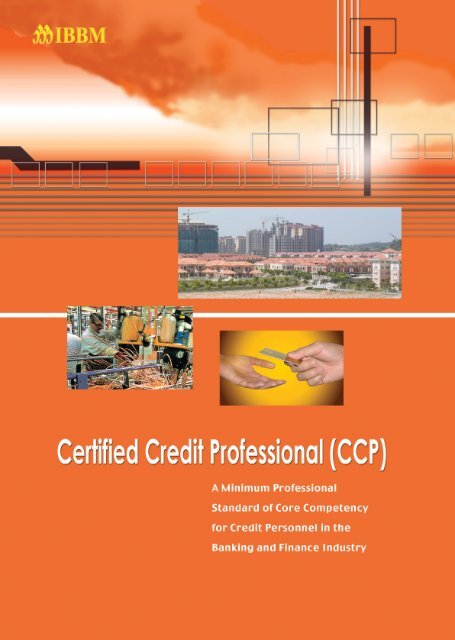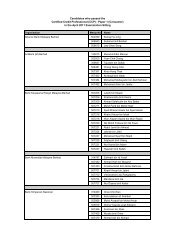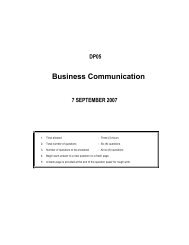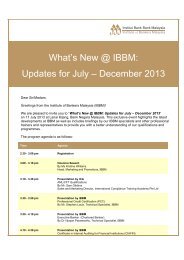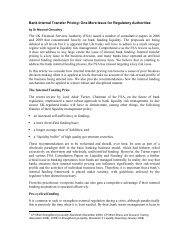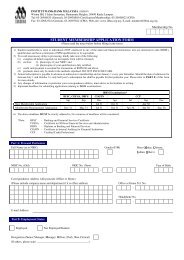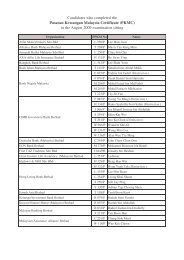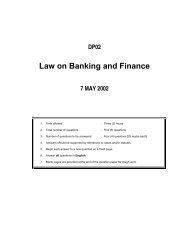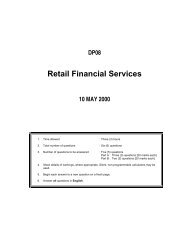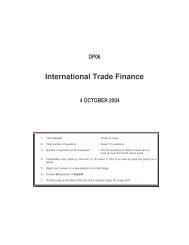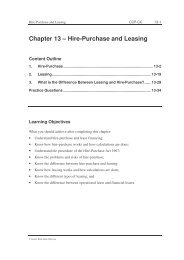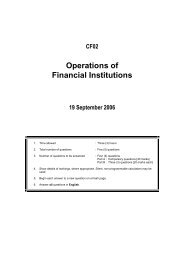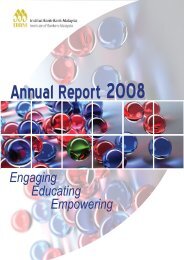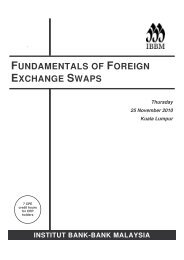financial system and principles of credit - Institute of Bankers Malaysia
financial system and principles of credit - Institute of Bankers Malaysia
financial system and principles of credit - Institute of Bankers Malaysia
Create successful ePaper yourself
Turn your PDF publications into a flip-book with our unique Google optimized e-Paper software.
GENERAL INFORMATION<br />
Introduction<br />
Developed by IBBM in consultation with senior<br />
<strong>credit</strong> practitioners, the Certified Credit Pr<strong>of</strong>essional<br />
(CCP) is a specialist pr<strong>of</strong>essional certification<br />
that demonstrates achievement <strong>of</strong> the minimum<br />
pr<strong>of</strong>essional st<strong>and</strong>ard <strong>of</strong> core competency for<br />
<strong>credit</strong> personnel in the banking <strong>and</strong> finance<br />
industry.<br />
Objectives<br />
To gain <strong>and</strong> develop skills-enabling knowledge<br />
pertaining to the:<br />
•<br />
•<br />
•<br />
•<br />
•<br />
roles <strong>and</strong> functions <strong>of</strong> <strong>credit</strong> in the <strong>Malaysia</strong>n<br />
<strong>financial</strong> <strong>system</strong>;<br />
regulation <strong>and</strong> guidelines governing lending in<br />
<strong>Malaysia</strong>;<br />
<strong>principles</strong> <strong>of</strong> lending <strong>and</strong> the associated risks;<br />
types <strong>of</strong> borrowers, securities <strong>and</strong> <strong>credit</strong><br />
support; <strong>and</strong><br />
<strong>credit</strong> process specific to either consumer or<br />
business lending.<br />
Syllabus Structure<br />
Common:<br />
Financial System <strong>and</strong> Principles <strong>of</strong> Credit<br />
Specialisation (your choice for either<br />
one):<br />
- Consumer Credit; or<br />
- Business Credit.<br />
Pr<strong>of</strong>essional Credential<br />
There are two awards: CCP (Consumer) <strong>and</strong><br />
CCP (Business) for the respective specialisation.<br />
Assessment Structure<br />
• Multiple-choice questions (MCQs) for the<br />
common <strong>and</strong> respective specialist syllabus;<br />
• Case study(ies) that encompass the complete<br />
content areas from the common <strong>and</strong><br />
respective specialist syllabus.<br />
Eligibility<br />
The CCP qualification is open to all individual<br />
members <strong>of</strong> IBBM. There is no other entry<br />
requirement.<br />
Preparation for Examinations<br />
C<strong>and</strong>idates prepare for the examinations through<br />
self-study using the study materials provided by<br />
IBBM upon first registration <strong>of</strong> examination.<br />
However, c<strong>and</strong>idates are strongly encouraged to<br />
attend related <strong>credit</strong> training programmes<br />
conducted either by IBBM or their respective<br />
<strong>financial</strong> institutions to enhance the knowledge<br />
acquired from their self-study effort. (Kindly<br />
contact our Continuing Pr<strong>of</strong>essional Development<br />
Department for further details on the training<br />
programmes.)<br />
Time Limit<br />
A c<strong>and</strong>idate will be given up to a maximum <strong>of</strong> 60<br />
months (5 years) from the date <strong>of</strong> registration <strong>of</strong> the<br />
first examination sitting, to complete the required<br />
papers under the respective specialisation.<br />
If a c<strong>and</strong>idate fails to obtain an award within the<br />
stipulated duration, all accumulated passes will be<br />
nullified <strong>and</strong> the c<strong>and</strong>idate will need to start afresh<br />
with another cycle <strong>of</strong> validity period.<br />
Frequency <strong>of</strong> Examinations<br />
Examinations for all five papers will be held twice a<br />
year. The examination schedule will be published in<br />
IBBM's newsletter <strong>and</strong> website.<br />
Examination Centres<br />
• Kuala Lumpur<br />
• Penang<br />
• Kota Bharu<br />
• Johor Bahru<br />
• Kota Kinabalu<br />
• Kuching<br />
The examination format information is on Page 5 <strong>of</strong><br />
this brochure.<br />
1
SYLLABUS<br />
FINANCIAL SYSTEM AND PRINCIPLES OF CREDIT<br />
1. The <strong>Malaysia</strong>n Financial System<br />
1.1 The banking <strong>system</strong><br />
1.2 Functions <strong>and</strong> responsibilities <strong>of</strong> banking<br />
<strong>system</strong> – monetary <strong>and</strong> non-monetary<br />
institutions<br />
1.3 Functions <strong>and</strong> responsibilities <strong>of</strong><br />
non-bank <strong>financial</strong> intermediaries<br />
1.4 Other institutions <strong>and</strong> bodies<br />
2. Credit <strong>and</strong> Economic Growth<br />
2.1 Introduction <strong>and</strong> definition <strong>of</strong> <strong>credit</strong><br />
2.2 Role <strong>of</strong> <strong>credit</strong> in economic growth<br />
2.3 Credit <strong>and</strong> money supply<br />
2.4 Credit <strong>and</strong> inflation<br />
2.5 Credit <strong>and</strong> stability <strong>of</strong> <strong>financial</strong> institutions<br />
2.6 Credit crunch <strong>and</strong> its consequences<br />
3. Banking <strong>and</strong> Financial Institutions<br />
Act (BAFIA) 1989<br />
3.1 Provisions relevant to <strong>credit</strong> under BAFIA<br />
1989<br />
4. Bank Negara <strong>Malaysia</strong> Guidelines<br />
4.1 Knowledge <strong>of</strong> procedures, limitations<br />
<strong>and</strong> restrictions <strong>of</strong> activities involved<br />
in processing <strong>and</strong> approval <strong>of</strong> <strong>credit</strong>,<br />
<strong>and</strong> monitoring implementation <strong>of</strong> <strong>credit</strong><br />
5. Exchange Control Notices<br />
5.1 Knowledge <strong>of</strong> restrictions as provided<br />
for in the various ECMs in relation to<br />
extension <strong>of</strong> <strong>credit</strong> facilities<br />
6. Foreign Investment Committee<br />
Guidelines<br />
6.1 Objectives <strong>and</strong> rationale for FIC<br />
guidelines<br />
6.2 Guidelines on purchase <strong>of</strong> properties<br />
by foreigners/non-residents/foreign<br />
interests – residential, commercial,<br />
factories & l<strong>and</strong><br />
6.3 Implications <strong>of</strong> contravention<br />
7. Principles <strong>of</strong> Lending<br />
7.1 What is <strong>credit</strong><br />
7.2 The <strong>credit</strong> process cycle<br />
7.3 Fundamental <strong>credit</strong> <strong>principles</strong><br />
7.4 Fundamental <strong>credit</strong> risk management<br />
<strong>principles</strong><br />
8. Types <strong>of</strong> Risks <strong>and</strong> Risk Mitigation<br />
8.1 Credit risk<br />
8.2 Market risk<br />
8.3 Operational risk<br />
8.4 Funding risk<br />
9. Types <strong>of</strong> Borrowers<br />
9.1 Personal<br />
9.2 Sole proprietorship<br />
9.3 Partnership<br />
9.4 Company<br />
9.5 Co-operative<br />
9.6 Society<br />
9.7 Government corporation <strong>and</strong> agency<br />
10. Basic Credit Factors<br />
10.1 5Cs <strong>of</strong> <strong>credit</strong>: character, capacity,<br />
capital, conditions <strong>and</strong> collateral<br />
10.2 Other <strong>credit</strong> factors<br />
11. Securities<br />
11.1 Types <strong>and</strong> forms <strong>of</strong> securities<br />
11.2 Secured <strong>and</strong> unsecured lending<br />
11.3 Features <strong>and</strong> attributes <strong>of</strong> a good<br />
security<br />
11.4 Security instruments<br />
11.5 Principal <strong>and</strong> subsidiary instruments<br />
11.6 Stamping<br />
12. Credit Support<br />
12.1 Guarantees<br />
12.2 Indemnity<br />
12.3 Insurance policies<br />
12.4 Undertakings<br />
12.5 Statutory declarations<br />
13. Pricing<br />
13.1 Types <strong>of</strong> <strong>credit</strong><br />
13.2 Considerations in loan pricing<br />
13.3 Methods <strong>of</strong> loan pricing<br />
13.4 Cost <strong>of</strong> funds<br />
13.5 BLR computation<br />
13.6 Basis <strong>of</strong> interest computation<br />
13.7 Other charges<br />
14. Islamic Banking<br />
14.1 Islamic banking <strong>principles</strong><br />
14.2 Differences between conventional <strong>and</strong><br />
Islamic banking <strong>system</strong>s<br />
2
SYLLABUS<br />
CONSUMER CREDIT<br />
1. Scope <strong>of</strong> Consumer Credit<br />
1.1 What is consumer <strong>credit</strong><br />
1.2 Consumer <strong>credit</strong> products<br />
1.3 Consumer <strong>credit</strong> process<br />
2. Marketing <strong>and</strong> Sales <strong>of</strong> Consumer<br />
Credit<br />
2.1 Role <strong>of</strong> marketing<br />
2.2 Characteristics <strong>of</strong> today's consumer<br />
borrowers<br />
2.3 Principles <strong>of</strong> selling<br />
2.4 Cross-selling opportunities in <strong>credit</strong><br />
3. Credit Origination<br />
3.1 Required information<br />
3.2 Various sources <strong>of</strong> <strong>credit</strong> information<br />
4. Credit Verification<br />
4.1 The verification process<br />
4.2 Techniques for spotting irregularities<br />
5. Credit Evaluation<br />
5.1 The 5Cs approach<br />
5.2 The CAMPARI model<br />
5.3 The <strong>credit</strong> scoring approach<br />
6. Security <strong>and</strong> Support<br />
6.1 L<strong>and</strong><br />
6.2 Fixed deposit<br />
6.3 Shares<br />
6.4 Unit trust<br />
6.5 Support documents<br />
7. Loan Disbursement<br />
7.1 Covenants in lending<br />
7.2 Pre-disbursement<br />
7.3 Post-disbursement<br />
8. Loan Monitoring<br />
8.1 Identification <strong>of</strong> warning signs<br />
8.2 Proactive prevention<br />
9. Loan Collection <strong>and</strong> Recovery<br />
9.1 Collection process<br />
9.2 Recovery process<br />
10. Consumer Credit Products<br />
10.1 Property financing<br />
10.2 Investment financing<br />
10.3 Consumption <strong>credit</strong><br />
10.4 Hire-purchase <strong>and</strong> leasing<br />
10.5 Islamic consumer financing<br />
An underst<strong>and</strong>ing <strong>of</strong> the following areas is<br />
required for each consumer <strong>credit</strong> product<br />
under items 10.1 – 10.4:<br />
(a) Features, benefits <strong>and</strong> related risks<br />
(b) Terms <strong>and</strong> conditions<br />
(c) Specific regulations (if any)<br />
(d) Application <strong>of</strong> <strong>credit</strong> considerations<br />
(e) Supervision <strong>and</strong> control<br />
3<br />
BUSINESS CREDIT<br />
1. Scope <strong>of</strong> Credit Evaluation<br />
1.1 Purpose <strong>and</strong> structure; facts, qualitative,<br />
quantitative <strong>and</strong> ways-out analysis<br />
2. Types <strong>of</strong> Financing<br />
2.1 Working capital, capital expenditure,<br />
bridging, infrastructure, transactional<br />
<strong>and</strong> seasonal financing<br />
3. Qualitative Risk Analysis<br />
3.1 Types <strong>of</strong> borrowers<br />
3.2 Underst<strong>and</strong>ing the business cycle<br />
3.3 Types <strong>of</strong> <strong>credit</strong> risk<br />
3.4 Business strategies <strong>and</strong> the corporate plan<br />
3.5 Product life cycle<br />
3.6 Using SWOT analysis as a <strong>credit</strong> tool<br />
4. Quantitative Risk Analysis<br />
4.1 General accounting <strong>principles</strong><br />
4.2 Balance sheet<br />
4.3 Pr<strong>of</strong>it <strong>and</strong> loss statement<br />
4.4 Cash flow statement<br />
4.5 Financial analysis techniques<br />
4.6 Limitation <strong>of</strong> <strong>financial</strong> <strong>and</strong> cash flow<br />
statements<br />
4.7 Qualitative aspects <strong>of</strong> <strong>financial</strong> analysis<br />
5. Loan Structuring<br />
5.1 Objectives <strong>and</strong> process <strong>of</strong> <strong>credit</strong><br />
facilities structuring<br />
5.2 Types <strong>of</strong> <strong>credit</strong> facilities<br />
5.3 Determining business funding<br />
requirements<br />
5.4 Security & support<br />
5.5 Covenants in lending<br />
5.6 Conditions precedent<br />
5.7 Pricing <strong>of</strong> loans<br />
6. Loan Monitoring<br />
6.1 Managing the loan portfolio<br />
6.2 Identification <strong>of</strong> warning signs<br />
6.3 Early symptoms <strong>of</strong> <strong>financial</strong> distress<br />
6.4 Causes <strong>of</strong> <strong>credit</strong> deterioration <strong>and</strong><br />
remedies
EXAMINATION ENROLMENT<br />
Examination Enrolment<br />
Only current IBBM individual members are eligible<br />
to enrol for the examinations.<br />
C<strong>and</strong>idates are required to submit their<br />
examination entries according to the enrolment<br />
schedule as published in IBBM's website at<br />
www.ibbm.org.my/qualifications/exam-info/.<br />
Examination Fee<br />
New C<strong>and</strong>idate<br />
: RM250 per examination<br />
paper<br />
Referral C<strong>and</strong>idate : RM200 per examination<br />
paper<br />
Attendance <strong>and</strong> Results Notice<br />
Attendance Notices will be despatched<br />
to c<strong>and</strong>idates two weeks before each<br />
examination sitting.<br />
Examination results will be issued in writing<br />
by post approximately:<br />
- 3 weeks after the Paper 1,2 or 3<br />
examinations.<br />
- 12 weeks after the Paper 4 or 5<br />
examinations.<br />
Examination Entries<br />
Changes<br />
No changes in a c<strong>and</strong>idate's entry details for an<br />
examination will be accepted after the closing<br />
date. C<strong>and</strong>idates must ensure that their details are<br />
correct before submission to the <strong>Institute</strong> for<br />
examination registration.<br />
Withdrawal<br />
Deferment<br />
Deferment <strong>of</strong> examinations must be made in<br />
writing <strong>and</strong> submitted to IBBM before the<br />
examination registration closing date.<br />
Transfer<br />
If a c<strong>and</strong>idate is unable to attend an examination<br />
because <strong>of</strong> illness, his entry may be transferred to<br />
the immediate next sitting for that examination. A<br />
written application must be submitted together<br />
with medical documents <strong>and</strong> a transfer fee <strong>of</strong><br />
RM100 per paper, not later than two weeks after<br />
the examination.<br />
C<strong>and</strong>idates can request to either defer or transfer<br />
their examination entry only once to the<br />
immediate next sitting.<br />
Important Notes to C<strong>and</strong>idates<br />
The decision <strong>of</strong> the <strong>Institute</strong>'s Education<br />
Committee on all examination results is final. All<br />
appeals will NOT be considered <strong>and</strong> IBBM will<br />
not enter into any correspondence regarding<br />
review <strong>of</strong> examination results.<br />
Any c<strong>and</strong>idate found guilty <strong>of</strong> misconduct or<br />
contravention <strong>of</strong> examination instructions will<br />
be liable to disciplinary action <strong>and</strong> may be<br />
disqualified from future examination sittings<br />
<strong>and</strong> removed from IBBM's membership register<br />
for life.<br />
The c<strong>and</strong>idate's employer will also be notified<br />
<strong>of</strong> his/her misconduct or contravention <strong>of</strong> the<br />
examination instructions.<br />
C<strong>and</strong>idates are advised to read IBBM's<br />
newsletter <strong>and</strong> check IBBM's website for<br />
updates to the examination syllabus <strong>and</strong> study<br />
materials, changes to the examination dates,<br />
rules, <strong>and</strong> procedures.<br />
Withdrawal from the examinations must be made<br />
in writing <strong>and</strong> submitted to IBBM before the<br />
examination registration closing date.<br />
DISCLAIMER<br />
• IBBM reserves the right to amend a member's examination status to take cognizance <strong>of</strong> any changes or revision in the examination<br />
structure <strong>and</strong> syllabus.<br />
• In the event that IBBM is unable to hold any <strong>of</strong> its scheduled examinations or that a c<strong>and</strong>idate's answer sheet is lost or destroyed, for<br />
reasons beyond its control, IBBM's liability shall be limited to a refund <strong>of</strong> the examination fees paid.<br />
• The information contained in this brochure is correct at the time <strong>of</strong> compilation. The <strong>Institute</strong> reserves the right to make alterations<br />
without notice to the material contained <strong>and</strong> described in this brochure.<br />
4
CCP EXAMINATION FORMAT<br />
PAPER 1<br />
Financial System <strong>and</strong> Principles <strong>of</strong> Credit<br />
50 MCQs, 1 1 /2-hour exam, pass mark: 80%<br />
PAPER 2<br />
Consumer Credit<br />
50 MCQs, 1 1 /2-hour exam,<br />
pass mark: 80%<br />
Paper 1 must be attempted<br />
at the first sitting <strong>of</strong> the<br />
examination. If a c<strong>and</strong>idate fails<br />
to pass Paper 1, he/she MUST<br />
include Paper 1 as one <strong>of</strong> the<br />
papers to be examined in<br />
subsequent sitting(s).<br />
PAPER 3<br />
Business Credit<br />
50 MCQs, 1 1 /2-hour exam,<br />
pass mark: 80%<br />
PAPER 4<br />
Applied Consumer Credit<br />
4 or 5 caselets, 3-hour exam,<br />
pass mark:<br />
60% for a compulsory<br />
section <strong>and</strong><br />
60% for the whole paper<br />
Pre-requisites for Papers 4 <strong>and</strong> 5:<br />
For Paper 4: Must have passed<br />
Papers 1 & 2.<br />
For paper 5: Must have passed<br />
Papers 1 & 3.<br />
Caselets / Case study<br />
encompass the complete<br />
content areas from the<br />
common <strong>and</strong> respective<br />
specialist syllabus.<br />
PAPER 5<br />
Applied Business Credit<br />
1 case study, 6-hour exam,<br />
pass mark: 60%<br />
AWARD<br />
CCP (Consumer)<br />
AWARD<br />
CCP (Business)<br />
September 2004<br />
Institut Bank-Bank <strong>Malaysia</strong> (35880-P)<br />
Wisma IBI, 5 Jalan Semantan, Damansara Heights, 50490 Kuala Lumpur<br />
Tel: 03-20938803 Fax: 03-20952322<br />
Web site: www.ibbm.org.my E-mail: qualifications@ibbm.org.my<br />
5


